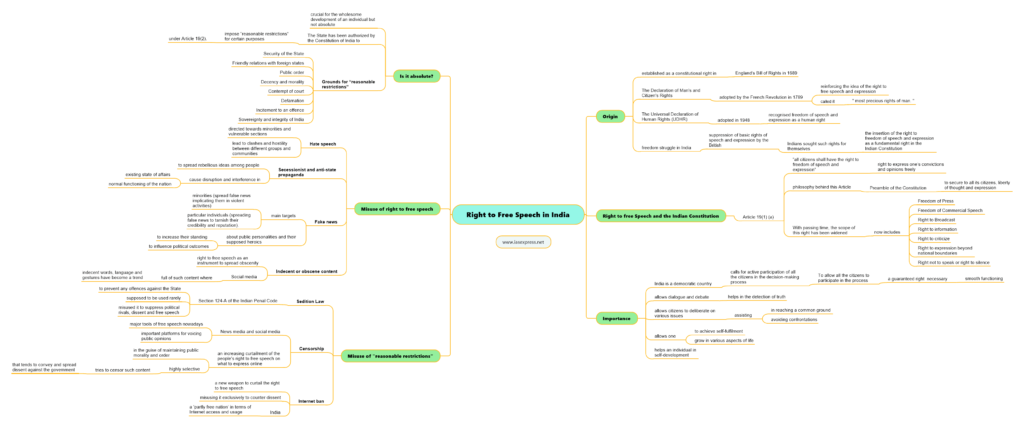Right to Free Speech in India – Misuse and Reasonable Restrictions

Freedom of speech and expression and hate speech have become synonymous in India. The recent controversy that took place at the Haridwar religious assembly where few speakers advocated genocide against Muslims and the use of the Bulli Bai app to defame Muslim women are the best examples. Such incidents not only hurt those who are the targets of this hatred but also highlight how the fundamental right of freedom of speech and expression guaranteed in the Indian Constitution is misused in our country. The question now arises whether this right is absolute and if not, what makes it susceptible to misuse?

Origin
- The concept of the right to free speech was established as a constitutional right in England’s Bill of Rights in 1689.
- In 1789, The Declaration of Man’s and Citizen’s Rights was adopted by the French Revolution reinforcing the idea of the right to free speech and expression by calling it the ” most precious rights of man. “
- The Universal Declaration of Human Rights (UDHR) adopted in 1948 also recognised freedom of speech and expression as a human right and stated that everyone has the right to freely express their thoughts and opinions.
- During the freedom struggle in India, the suppression of basic rights of speech and expression by the British made the Indians seek such rights for themselves that reached a culminating point with the insertion of the right to freedom of speech and expression as a fundamental right in the Indian Constitution (adopted on 26th November 1949).
Right to free speech and the Indian Constitution
- Article 19(1) (a) of the Constitution of India states that “all citizens shall have the right to freedom of speech and expression”. The philosophy behind this Article (fundamental right) lies in the Preamble of the Constitution, where it seeks to secure to all its citizens, liberty of thought and expression.
- The Article grants the citizens the right to express one’s convictions and opinions freely by words of mouth, writing, printing, pictures or any other mode. It thus includes the expression of one’s idea through any communicable medium or visible representation, such as gesture, signs, and the like.
- With passing time, the scope of this right has been widened by the judiciary in India through its wisdom, creativity and craftsmanship. Thus, it now includes:
- Freedom of Press (grants freedom of publication, freedom of circulation and freedom against pre-censorship).
- Freedom of Commercial Speech (commercial advertisement or commercial speech).
- Right to Broadcast.
- Right to information.
- Right to criticize.
- Right to expression beyond national boundaries.
- Right not to speak or right to silence.
Importance
- India is a democratic country and thus it calls for active participation of all the citizens in the decision-making process. To allow all the citizens to participate in the process, there needs to be a guaranteed right that people can exercise to express their opinion and conviction. Thus, freedom of speech has a major role to play in the smooth functioning of the Indian democracy.
- Freedom of speech allows dialogue and debate thus helping in the detection of truth. It also allows citizens to deliberate on various issues thus assisting in reaching a common ground and avoiding confrontations.
- Freedom of speech also allows one to achieve self-fulfilment and grow in various aspects of life. It helps an individual in self-development. If one is restricted from expressing oneself, it may hamper one’s complete personality development and growth that may further hinder the growth of the nation as a whole.
Is the right absolute?
- Although the right is crucial for the wholesome development of an individual and a nation yet the Constitution of India does not make it absolute.
- The State has been authorized by the Constitution of India to impose “reasonable restrictions” for certain purposes under Article 19(2).
- Grounds for “reasonable restrictions”
- Security of the State
- Security of state refers to serious and aggravated forms of public disorder, e.g., rebellion, waging war against the state [entire state or part of the state], insurrection etc.
- The Constitution of India has the provision of reasonable restrictions that can be imposed on the freedom of speech and expression, in the interest of the security of the State.
- Friendly relations with foreign states
- The Constitution of India empowers the State to impose reasonable restrictions on the freedom of speech and expression if it hampers the friendly relations of India with other State or States.
- Public order
- The expression ‘public order’ stands for the public peace, safety and tranquillity.
- Anything that disturbs public peace disturbs public order and thus the State is empowered to impose reasonable restrictions to maintain public order.
- Decency and morality
- The Constitution of India limits the use of the right to freedom of speech on the grounds of decency and morality.
- The State is empowered to impose reasonable restrictions when the sale, distribution or exhibition of obscene words is carried out.
- Contempt of court
- The term contempt of court refers to civil contempt or criminal contempt under Section 2 of the Contempt of Courts Act, 1971. In general, it refers to a legal violation committed by an individual who disobeys a judge or a judgement or otherwise disrupts the legal process in the courtroom.
- The fundamental right to freedom of speech does not allow any person or entity to carry out such acts that may be considered as contempt of court.
- Defamation
- The right to free speech is not absolute and thus nobody is allowed to hurt the reputation of other fellow citizens.
- Clause (2) of Article 19 prevents any person from making any statement that defames the reputation of another.
- Incitement to an offence
- The Constitution of India also prohibits a person from making any statement that incites people to commit an offence.
- Sovereignty and integrity of India
- The Constitution of India prohibits a person from making statements that challenge the integrity and sovereignty of India.
- Security of the State
How is it misused?
- Hate speech
- Although the right to free speech comes as a right with “reasonable restrictions” yet many citizens of India consider this right as absolute and sacrosanct.
- The concept of the right to free speech as being a non-negotiable necessity among the citizens of India results in hate speech against other fellow communities.
- Hate speech is often directed towards minorities and vulnerable sections of society.
- Such hate speeches eventually lead to clashes and hostility between different groups and communities in our country.
- Secessionist and anti-state propaganda
- Several secessionist groups and anti-state elements use this right as a free pass to spread their rebellious ideas among people and cause disruption and interference in the existing state of affairs and normal functioning of the nation.
- Fake news
- Fake news has no accepted definition. However, it refers to such information that may be perceived as news that has been deliberately fabricated and is disseminated to deceive others or spread falsehood.
- In recent times, fake news has become a regular affair in India. The main target of fake news creators and spreaders are minorities (spread false news implicating them in violent activities) and particular individuals (spreading false news to tarnish their credibility and reputation).
- On the contrary, fake news is spread about public personalities and their supposed heroics to increase their standing and influence political outcomes.
- Such sensational and polarising fake news contents often lead to communal and social tensions, serious harm to individuals (lynching) and mistrust among people.
- Indecent or obscene content
- In the era of developing thoughts and new culture, it is rather difficult to identify and classify any content as obscene or indecent. However, several entities in India are using the right to free speech as an instrument to spread obscenity.
- Social media is full of such content where indecent words, language and gestures have become a trend.
- These not only spread immorality in society but also negatively influence children and youth.
Misuse of the concept of “reasonable restrictions”
Governments at various levels in India have been trying to prevent the misuse of the right to free speech to prevent social disharmony and unrest. However, in the garb of doing so, the governments tend to misuse the concept of “reasonable restrictions”. This can be noticed in the following acts:
- Sedition Law
- Section 124-A of the Indian Penal Code considers it an offence to speak, write or indicate by signs or visually represent anything that attempts to bring into hatred or contempt, or excites or attempts to excite disaffection towards, the Government established by law in [India].
- Although this law was enacted in 1860, under the British Raj, to prevent any offences against the State, it was reimposed by the Government of India through the First Amendment in 1951 and also strengthened by adding two expressions – “friendly relations with foreign state” and “public order” – as grounds for imposing “reasonable restrictions” on free speech.
- The law was supposed to be used rarely. However, governments from time to time have misused it to suppress political rivals, dissent and free speech.
- As per the National Crime Records Bureau, there has been a drastic rise in the cases of sedition in India from 47 in 2014 to 93 in 2019, around 163 per cent jump.
- This shows how the law is being widely used in recent times.
- Censorship
- News media and social media are major tools of free speech nowadays. They are also very powerful tools for disseminating information in society. They have become important platforms for voicing public opinions as well.
- However, there has been an increasing curtailment of the people’s right to free speech on what to express online, with the curtailment being at times highly selective.
- The Government in the guise of maintaining public morality and order often tries to censor such content that tends to convey and spread dissent against it.
- Internet ban
- Internet ban has become a new weapon to curtail the right to free speech.
- Governments in the name of maintaining public order are misusing it exclusively to counter dissent.
- India is considered to be a ‘partly free nation’ in terms of Internet access and usage.
- India has the most cases of Internet shutdowns excluding the shutdowns in Jammu and Kashmir.
- As per recent data, there have been 455 shutdowns since 2012 out of which 134 shutdowns happened in 2018, 106 in 2019, and 77 in 2020.
- The bans not only harm common people but also the educational system and administration that eventually hinder people’s accessibility to basic facilities.
Way forward
There is a need for striking balance between ‘too much of freedom’ and ‘too little of freedom’. This can be done by doing away with ambiguities present in these provisions (right to free speech and “reasonable restrictions”). Judiciary can play a leading role in doing so. It will not only help India to secure to its citizens the liberty of thought and expression but also hinder the State from carrying out the arbitrary use of “reasonable restrictions”. Maintaining a perfect balance will go a long way and help India reach the much-revered goals of the Indian Constitution.
Practise Question
Q. Are “reasonable restrictions” on the Fundamental Rights in India justified? Comment.
- https://www.latestlaws.com/articles/freedom-of-speech-and-expression-exigency-for-balance/
- https://www.investopedia.com/terms/c/contempt-court.asp#:~:text=Contempt%20of%20court%20is%20a,civil%2C%20and%20direct%20versus%20indirect.
- https://www.legalserviceindia.com/legal/article-572-constitution-of-india-freedom-of-speech-and-expression.html
- https://www.legalserviceindia.com/legal/article-5162-freedom-speech-a-tool-for-governmental-misuse-.html
- https://www.downtoearth.org.in/news/governance/banning-fake-news-endangers-free-speech-press-freedom-65594
- https://www.advocateshah.com/blog/freedom-of-speech-and-expression-need-to-protect-it/#:~:text=Freedom%20of%20speech%20is%20there,taking%20part%20in%20decision%2Dmaking.
- https://www.iilsindia.com/blogs/right-freedom-speech-expression-vis-vis-freedom-press/
- https://www-indiatimes-com.cdn.ampproject.org/v/s/www.indiatimes.com/amp/news/india/freedom-of-speech-and-expression-in-india-554739.html?amp_js_v=a6&_gsa=1&usqp=mq331AQKKAFQArABIIACAw%3D%3D#aoh=16422269468936&csi=1&referrer=https%3A%2F%2Fwww.google.com&_tf=From%20%251%24s&share=https%3A%2F%2Fwww.indiatimes.com%2Fnews%2Findia%2Ffreedom-of-speech-and-expression-in-india-554739.html
- https://www.indialegallive.com/venomous-times/
- https://www.theleaflet.in/the-haridwar-hate-assembly-the-answer-to-divisive-politics-is-not-law-but-civil-society-mobilisation/
If you like this post, please share your feedback in the comments section below so that we will upload more posts like this.

